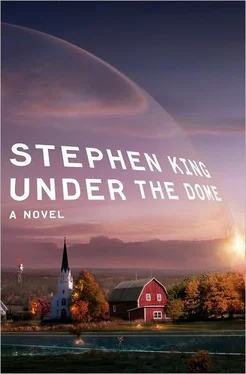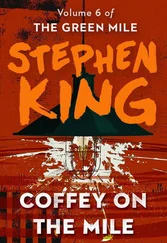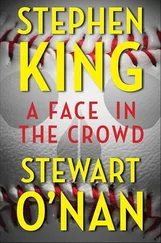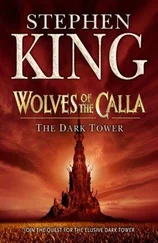“There’s nothing but reruns of the plane-crash footage,” Rose said. “If you haven’t seen it before, be my guest. Jackie, I saw Barbie late this morning—I took him some sandwiches and they let me go downstairs to where the cells are. I had Melvin Searles as my chaperone.”
“Lucky you,” Jackie said.
“How is he?” Julia asked. “Is he okay?”
“He looks like the wrath of God, but I think so, yes. He said… maybe I should tell you privately, Jackie.”
“Whatever it is, I think you can say it in front of Ernie and Julia.” Rose considered this, but only for a moment. If Ernie Calvert and Julia Shumway weren’t all right, nobody was. “He said I was supposed to talk to you. Make up with you, as if we’d had a fight. He said to tell you that I’m all right.”
Jackie turned to Ernie and Julia. It seemed to Rose that a question was asked and answered. “If Barbie says you are, then you are,” Jackie said, and Ernie nodded emphatically. “Hon, we’re putting together a little meeting tonight. At the Congo parsonage. It’s kind of a secret—”
“Not kind of, it is, ” Julia said. “And given the way things are in town right now, the secret better not get out.”
“If it’s about what I think it’s about, I’m in.” Then Rose lowered her voice. “But not Anson. He’s wearing one of those goddam arm-bands.”
Just then the CNN BREAKING NEWS logo came on the TV screen, accompanied by the annoying minor-key disaster music the network was now playing with each new Dome story. Rose expected either Anderson Cooper or her beloved Wolfie—both were now based in Castle Rock—but it was Barbara Starr, the network’s Pentagon correspondent. She was standing outside the tent-and-trailer village serving as the Army’s forward base in Harlow.
“Don, Kyra—Colonel James O. Cox, the Pentagon’s point man since the mammoth mystery known as the Dome came into being last Saturday, is about to speak to the press for only the second time since this crisis began. The subject was announced to reporters just moments ago, and it’s sure to galvanize the tens of thousands of Americans with loved ones in the beleaguered town of Chester’s Mill. We were told—” She listened to something in her earpiece. “Here’s Colonel Cox.”
The four in the restaurant sat on stools at the counter, watching as the picture switched to the inside of a large tent. There were perhaps forty reporters seated in folding chairs, and more standing in the back. They were murmuring among themselves. A makeshift stage had been set up at one end of the tent. On it was a podium festooned with microphones and flanked by American flags. There was a white screen behind it.
“Pretty professional, for an on-the-fly operation,” Ernie said.
“Oh, I think this has been in the works,” Jackie said. She was recalling her conversation with Cox. We’re going to do our level best to make Rennie’s life uncomfortable, he’d said.
A flap opened to the left side of the tent, and a short, fit-looking man with graying hair strode briskly to the makeshift stage. No one had thought to put down a couple of stairs or even a box to stand on, but this presented no problem to the featured speaker; he hopped up easily, not even breaking stride. He was dressed in plain khaki BDUs. If he had medals, they weren’t in evidence. There was nothing on his shirt but a strip reading COL. J. COX. He held no notes. The reporters quieted immediately, and Cox gave them a little smile.
“This guy should have been holding press conferences all along,” Julia said. “He looks good. ”
“Hush, Julia,” Rose said.
“Ladies and gentlemen, thank you for coming,” Cox said. “I’ll be brief, and then I’ll take a few questions. The situation as regards Chester’s Mill and what we’re all now calling the Dome is as it was: the town continues to be cut off, we still have no idea about what is causing this situation or what brought it about, and we have as yet had no success in breaching the barrier. You would know, of course, if we had. The best scientists in America—the best in the entire world—are on the case, however, and we’re considering a number of options. Do not ask me about these, because you’ll get no answers at this time.”
The reporters murmured discontentedly. Cox let them. Below him, the CNN super switched to NO ANSWERS AT THIS TIME. When the murmuring died, Cox went on.
“As you’re aware, we have established a no-go zone around the Dome, initially of a mile, expanded to two on Sunday and four on Tuesday. There were a number of reasons for this, the most important being that the Dome is dangerous to people with certain implants, such as pacemakers. A second reason is that we were concerned the field generating the Dome might have other harmful effects which would be less clearly recognized.”
“Are you talking about radiation, Colonel?” someone called.
Cox froze him with a glance, and when he seemed to consider the reporter properly chastised (not Wolfie, Rose was pleased to see, but that half-bald no-spin yapper from FOX News), he went on.
“We now believe that there are no harmful effects, at least in the short term, and so we have designated Friday, October twenty-seventh—the day after tomorrow—as Visitors Day at the Dome.”
A perfect fury of thrown questions went up at this. Cox waited it out, and when the audience had quieted down, he took a remote from the shelf under the podium and pressed a button. A high-resolution photograph (much too good to have been downloaded from Google Earth, in Julia’s estimation) popped up on the white screen. It showed The Mill and both towns to the south, Motton and Castle Rock. Cox put down the controller and produced a laser-pointer.
The super at the bottom of the screen now read FRIDAY DESIGNATED VISATORS DAY AT THE DOME. Julia smiled. Colonel Cox had caught CNN with its spell-checker down.
“We believe we can process and accommodate twelve hundred visitors,” Cox said crisply. “These will be limited to close relatives, at least this time… and all of us hope and pray there will never have to be a next time. Rally points will be here, at the Castle Rock Fair-grounds, and here, at Oxford Plains Speedway.” He highlighted both locations. “We will lay on two dozen buses, twelve at each location. These will be provided by six surrounding school districts, which are canceling classes that day to help in this effort, and we offer them our greatest thanks. A twenty-fifth bus will be available for press at Shiner’s Bait and Tackle in Motton.” Dryly: “Since Shiner’s is also an agency liquor store, I’m sure most of you know it. There will also be one, I repeat, one, video truck allowed on this trip. You’ll arrange pool coverage, ladies and gentlemen, the coverage provider to be chosen by lottery.”
A groan went up at this, but it was perfunctory.
“There are forty-eight seats on the press bus, and obviously there are hundreds of press representatives here, from all over the world—”
“Thousands!” a gray-haired man shouted, and there was general laughter.
“Boy, I’m glad someone’s havin fun,” Ernie Calvert said bitterly.
Cox allowed himself a smile. “I stand corrected, Mr. Gregory. Seats will be allocated according to your news organization—TV networks, Reuters, Tass, AP, and so on—and it’s up to those organizations to pick their representatives.”
“Better be Wolfie from CNN, that’s all I can say,” Rose announced.
The reporters were babbling excitedly.
“May I go on?” Cox asked. “And those of you sending text messages, kindly stop.”
“Ooo,” Jackie said. “I love a forceful man.”
“Surely you folks recall that you’re not the story here? Would you behave this way if it was a mine cave-in, or people trapped under collapsed buildings after an earthquake?”
Читать дальше











